The secrets to restful sleep
7.11.2019
The Four Stages of Sleep – What They Mean and Four Tips for Getting Better Sleep
Are you getting poor sleep? Finding out about the different stages of sleep can help. Here, we look at what they are, and some tips for helping you get a good night’s rest.
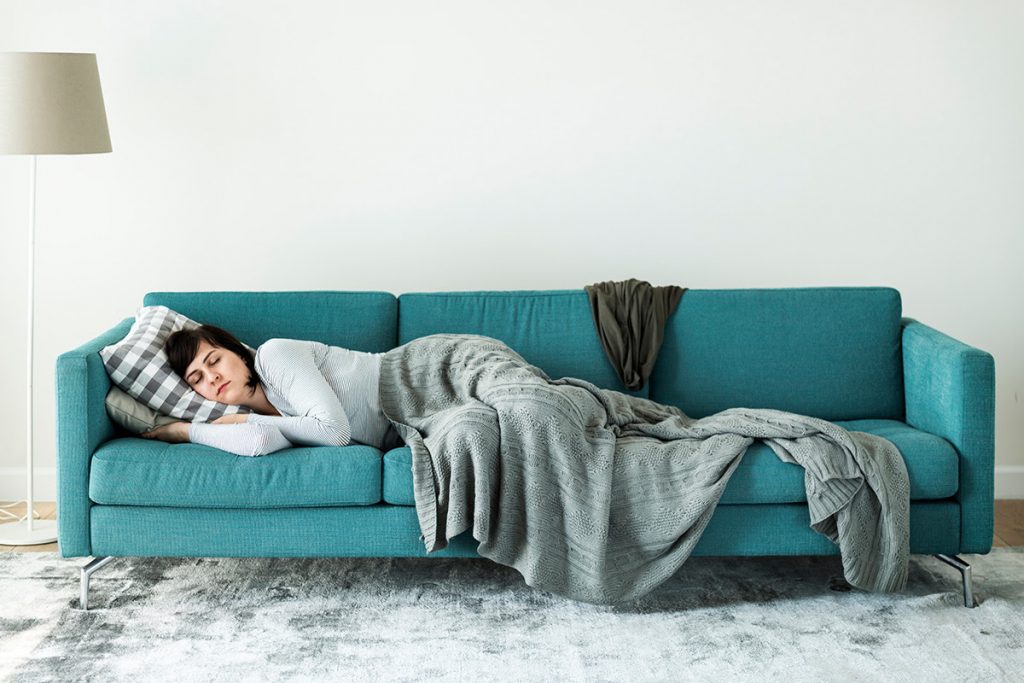
As many as 45% of Australians have poor sleep patterns¹. You might count as one of them. And it might not seem like a big deal until you realise that poor sleep can have a negative impact on your health.
Several studies link poor sleep to obesity². Researchers believe that those who don’t get enough sleep tend to have poorer diets. Plus, they struggle to motivate themselves to exercise. Poor sleep also has negative effects on your brain, as it affects your ability to concentrate³. It can also negatively impact your immune system and your mood⁴ ⁵.
Simply put, a poor sleep pattern doesn’t do your body any favours and could actively harm you.
Fortunately, there’s plenty you can do about your sleep pattern, including using essential oils. It all starts with developing an understanding of the different stages of sleep, and which essential oils target which stages.
The Four Stages of Sleep
Your body doesn’t go into a deep sleep from the moment you drop off. In fact, it goes through several stages, each having its own patterns and effects on the body.
You could sleep for eight hours a night, and still have poor sleep if your body doesn’t cycle through these 4 sleep stages.
Let’s look at each one to find out what they entail.
Stage #1
This stage occurs within minutes of you falling asleep. It involves your brain producing something called theta and alpha waves. And as this happens, your eye movement starts slowing down.
Your muscles also start to relax, which can produce some interesting phenomena. Have you ever felt yourself falling asleep, and starting to dream, then you see yourself falling and your body jerks suddenly to stop the fall? That’s one of the effects you might experience at this first stage of sleep.
You can almost think of this as the introduction to full sleep. If you’ve ever started drowsing without quite dropping off, you’re likely in this stage.
At this point, you’re in a very light sleep and will get woken up if something, such as a loud noise, alerts you. Your brain’s trying to shut itself off at this point.
This is where Vetiver oil can help.
Vetiver oil is extracted from the roots of the Vetiver grass. It’s a very pungent oil, reminiscent of the smell of a forest after a bushfire. Yet despite its strong aroma, Vetiver oil is one of the best oils for achieving stillness of mind, making it a fantastic oil for both meditation and sleep. Simply put a few drops in your diffuser, a drop on your third eye (between the eyebrows) or inhale from the bottle. You can even put a drop on a cotton pad and place it near your nose while you sleep.

Vetiver oil helps your brain switch off for the night, even if you’re thinking about things that may cause you to feel anxious⁶.
The good news is that this first stage of sleep doesn’t last very long. After about 7 to 10 minutes, your body will move past this introduction and into the second stage of sleep.
Stage #2
While this is still a fairly light sleep, it differs from stage one. The slow movements of your eyes cease entirely at this stage. It’s also tougher to rouse you from your sleep, so you’re unlikely to jerk awake if you hear a loud noise.
Your brain undergoes some interesting activity at this stage too. You’ll experience something called sleep spindles. These are extremely fast bursts of brain activity that occur almost randomly. Researchers believe that these bursts serve an important function when shutting your brain down. They basically act as a form of protection that prevents your brain from waking up.
Beyond what’s happening with your brain, there are a few other things that happen at this stage of sleep. For example, your heartbeat starts slowing down, and your body temperature drops.
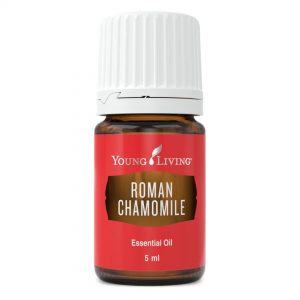
Again, Vetiver is a great oil to assist in stage 2 sleep, and so is Roman Chamomile. Roman Chamomile oil has a soothing effect that can help to slow your brain waves a little faster⁷.
I like to put a few drops on the back of my neck if I’m needing a deeper night’s sleep.
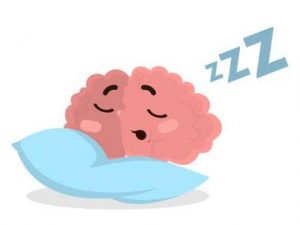
Stage #3
This is the deepest stage of sleep that you’ll experience during the course of the night. At this point, all eye movements cease and you become incredibly difficult to rouse from your slumber. This is also referred to as non-REM or NREM sleep.
Your brain will also start producing delta waves, which coax you into an even deeper sleep⁸.
Stage 3 of sleep is the stage where most of the restorative work happens. Your body will start repairing muscle tissues and building up the energy that you’re going to need the following day.
This is also an extremely important stage for children, as it’s here that a lot of growth and muscle development occurs.
This is where Lavender oil comes into play….just put a drop on each side of your pillow case, or a drop under your nose (or 5 to 10 drops in your bedside diffuser, depending on the size of your room).

A study published in Chronobiology International examined the effects of Lavender oil on 31 people. It concluded that Lavender oil can help people to achieve deeper sleep. It was also interesting that everyone who received Lavender oil reported more vigour the next morning.
Sandalwood oil can also help with this stage of sleep. According to one study⁹, santalol (a primary constituent of Sandalwood oil) was shown to significantly increase the amount of time that sleep-disturbed rats spent in NREM sleep. If it has the same effect on humans, it may very well help those who struggle to get past Stage #2, as well as those who enter Stage #4 too quickly.
Young Living has two varieties of Sandalwood oil – Sacred Sandalwood and Royal Hawaiian Sandalwood. While both of these oils have santalol in them as a key constituent, it’s in significantly higher amounts in Sacred Sandalwood, making this the better oil for sleep.
I love to put a drop of Sacred Sandalwood oil under my nose or on my cheeks immediately before I turn out the lights.
Stage #4
This is most commonly referred to as the dreaming stage of sleep. It’s where rapid eye movement (REM) starts to occur. You may look like you’re quickly blinking, and your eyes will dart from side to side. Your brain also gets more active during this stage, which makes it easier to wake you up.
Most people hit the fourth stage of sleep about 90 minutes after first falling asleep. They’ll experience REM sleep for about an hour before slipping back into the third stage. Then, they’ll flit between stages three and four until they eventually wake up.

Most of your dreaming occurs during REM sleep, although some can also occur in NREM sleep.
It’s at this fourth stage of sleep (the REM sleep) that your brain starts consolidating all of the information that it’s picked up during the day. That means it’s invaluable for the healthy development of memory and brain function.
If you’re looking for a Young Living oil to assist during REM sleep, you can’t go past Dream Catcher. Dream Catcher was formulated to help keep the bad dreams at bay, and to stimulate positive dreams and visions.
This applies both during sleep, and when you are awake and in that state of imagining and envisioning which is often referred to as “day dreaming”.
Just add 5 to 10 drops to your diffuser, or place a drop on your third eye (lower centre of the forehead, towards the eyebrows).
Four Tips for Getting Better Sleep
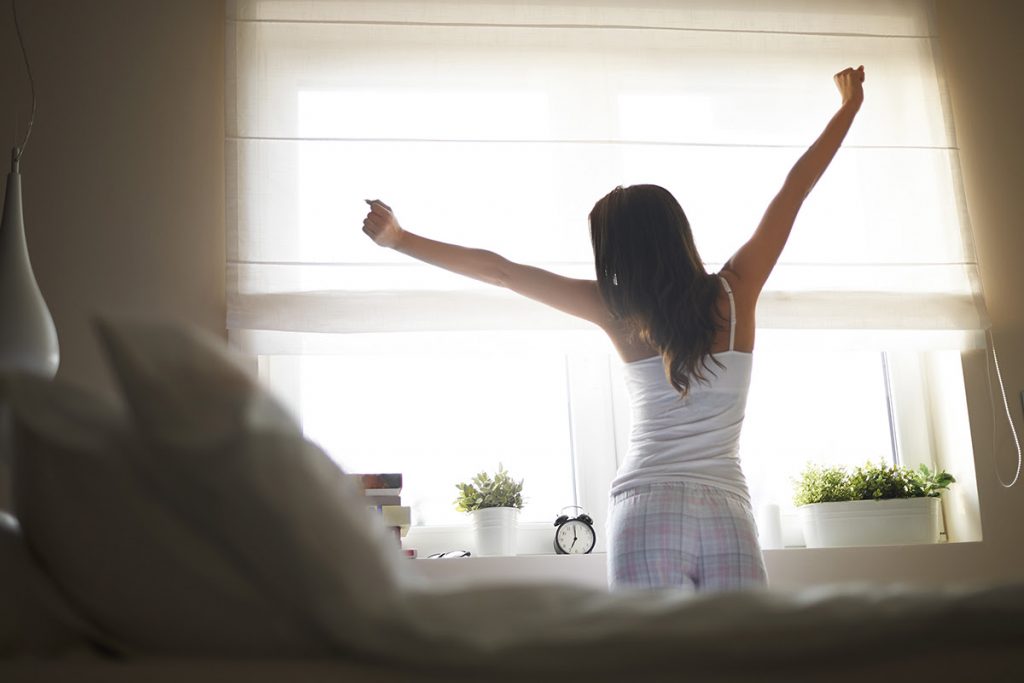
Now you know the stages, you need to know how to cycle through them. Poor sleep often stems from people struggling to reach stages three and four.
These four tips will help.

Tip #1: Light Exposure
Exposure to natural light during the day can help your sleep pattern. It helps your body to maintain its circadian rhythm, which basically acts as your body’s internal timer. If you spend a lot of time in the light during the day, your body knows that it’s time to be awake. It will also start preparing your body for sleep once the light fades, providing you’re not exposing your body to light at night.
Blue light causes the biggest problem in this regard. This is the type of light that computers, smartphones, and similar devices emit.
Avoid using such blue light devices before going to bed, and if you wear reading glasses, consider getting some specialised lenses for your glasses to block blue light. Your optometrist can provide more information about these lenses.
Tip #2: Avoid Caffeine
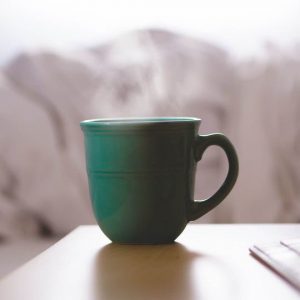
The vast majority of people consume caffeine during the day, whether it comes from coffee, chocolate, or soft drinks…..or even from healthy drinks such as Young Living’s NingXia Nitro and NingXia Zyng.
That’s okay as long as you moderate your intake. However, if you’re like the majority of people, you’ll face a real problem if you consume any foods or drinks that contain caffeine at night.
Caffeine stimulates your nervous system to the point where it can make it difficult for your body to relax.
In fact, one study shows that consuming caffeine as long as six hours before you go to bed can have a negative impact on sleep¹⁰.
As a general rule of thumb, avoid caffeine at night time if you’re having difficulties sleeping.
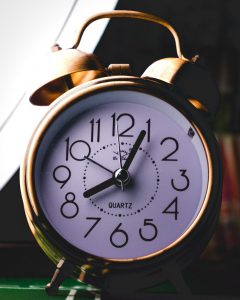
Tip #3: Create a Routine
This comes back to your body’s circadian rhythm.
If you have no routine built into how you sleep, your body struggles to maintain its natural rhythm. It might start trying to shut down when you need to stay awake. And you might find yourself tossing and turning in bed when you need to get to sleep.
Try to get yourself into a pattern. Go to bed at the same time every night and set an alarm to wake up at the same time each morning. If you can keep the pattern going for a couple of weeks, you’re likely to find that you no longer need the alarm.
Tip #4: Use Essential Oils
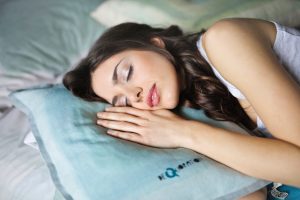
Applying essential oils topically before you go to bed is a great way to signal to your body that it’s time to relax.
You can use any of the oils mentioned above, however if you want to bring out the “big guns”, here’s a recipe that was given to me by Young Living’s founder, D. Gary Young.
The recipe is really simple:
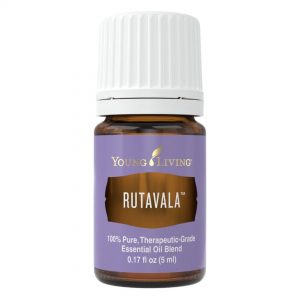
Apply one drop of RutaVaLa oil blend to your occipital region (at the back of your head, where your neck joins your skull), and apply three drops of Roman Chamomile down your neck.
I’ve mentioned the soothing effect that Roman Chamomile has. RutaVaLa contains 3 oils – Lavender, Ruta (also called Rue), and Valerian. Let’s explore these 3 oils:
We’ve already looked at how Lavender oil can affect your sleep patterns. Lavender oil improves the amount and quality of the sleep you get, and it improves both concentration and alertness when you are awake.
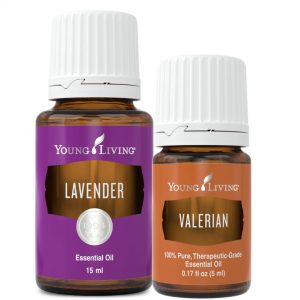
Valerian oil helps to calm your brain as you try to get to sleep, taking it into a state of stillness.
It’s especially effective as a way to soothe anxious thoughts, which can easily disturb a good nights’ sleep.
Ruta oil has a similar effect to Lavender and Valerian, except that it’s much more powerful. In South America, fronds from the rue plant (Ruta graveolens) are waved over crying babies to put them to sleep!
It also relieves tension and can soothe anxious thoughts. When used in conjunction with Valerian and Lavender, you have an extremely powerful way of calming your brain into sleep.
And of course you’ll be wondering whether you should use all of the essential oils I’ve mentioned in this article in the one night. I don’t. I choose one or two oils, and stick with them to see how they work for me.
I’ll use that oil (or oils) for a few nights, then I’ll switch around. By getting to know the effects of each oil, you will soon find that your intuition leads you to the oil that is right for you on that particular day.
Achieve Better Sleep Today
Poor sleep can have a more damaging effect on your body than you realise.
Now you understand why. If your body isn’t cycling into stages three and four of sleep, it can’t carry out essential repair work for your muscles and brain.
Use the tips shared here to help you achieve better sleep, and put some of these oils on your next Young Living order.
If you’ve never ordered before, or it’s been longer than 12 months since you’ve ordered, you will need to set up or reactivate your account. Please reach out to the person who introduced you to Young Living, or to my oils bulletin. If you’ve lost contact with them, please email us and we’ll be happy to assist.
Resources:
- https://www.healthline.com/
nutrition/10-reasons-why-good- sleep-is-important#section2 - https://www.kidspot.com.au/
parenting/child/child-sleep/ australians-arent-getting- enough-sleep-and-its-slowly- killing-us/news-story/ 21b94a49e0a673d2e5ebc909c189fa 32 - https://www.sleep.org/
articles/what-happens-during- sleep/ - https://www.tuck.com/stages/
- https://www.
theprairiehomestead.com/2014/ 03/essential-oils-sleep.html - https://www.aromafoundry.com/
blogs/aroma-foundry/6-best- essential-oils-cognitive- function - https://www.healthline.com/
nutrition/17-tips-to-sleep- better#section1 - https://www.helpguide.org/
articles/sleep/getting-better- sleep.htm/ - https://thesleepdoctor.com/
2018/06/12/7-essential-oils- for-relaxation-and-better- sleep/ - https://www.ncbi.nlm.nih.gov/
pubmed/24235903 - https://www.healthline.com/
nutrition/valerian-root# section3 - https://healthyfocus.org/
benefits-of-rue-herb/
References:
- https://www.
sleephealthfoundation.org.au/ pdfs/surveys/ SleepHealthFoundation-Survey. pdf - https://www.ncbi.nlm.nih.gov/
pmc/articles/PMC3632337/ - https://www.ncbi.nlm.nih.gov/
pubmed/10984335 - https://www.ncbi.nlm.nih.gov/
pubmed/8621064 - https://www.ncbi.nlm.nih.gov/
pubmed/16259539 - https://www.ncbi.nlm.nih.gov/
pubmed/25553641 - https://www.mdpi.com/2218-
0532/84/4/724/pdf - https://www.ncbi.nlm.nih.gov/
pubmed/16298774 - https://www.ncbi.nlm.nih.gov/
pubmed/17879595 - https://www.ncbi.nlm.nih.gov/
pubmed/24235903
If you’re not already receiving our weekly
Raw Divinity bulletin, CLICK HERE to subscribe
